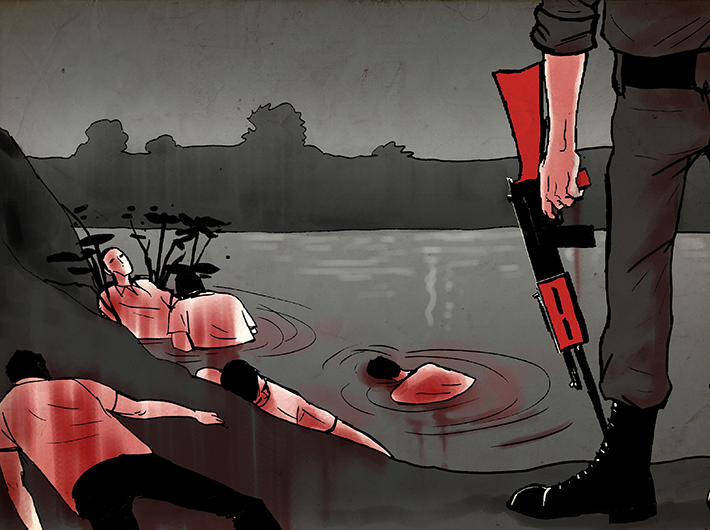The March 21 verdict exonerating the 16 policemen accused of killing 40 Muslims in Hashimpura, Meerut, on May 22, 1987, forms a pattern. One that reaffirms the state’s inalienable right to kill its citizens at will.
Like many massacres, the killing of these hapless people by a rogue band of Uttar Pradesh’s provincial armed constabulary (PAC) has faded from the memory of the younger generation. The tragedy seems quite a distance away, after 27 years of the trial.
Hashimpura? What! These marks of question and exclamation are a testimony to the Indian state’s consummate skill in erasing unpleasant memories. But those who lived those times and saw the events from close quarters would find it extremely difficult to obliterate the crime from their mental slate.
Those were the times when the killings in Hashimpura and Maliana were recounted gleefully by police officials. I still shudder at one such account. An IPS officer and batchmate of the Hashimpura mastermind in a fit of bravado once narrated the sequence of events that led to the killings. “This massacre was planned and executed by an officer who did all this between lighting two cigarettes,” he said.
In his account, the mastermind planned the killing while sitting in the Meerut police control room after he got fed up with the eruption of violence across the city. “He lit a cigarette and ordered the PAC to round up able-bodied Muslims,” the batchmate recalled, adding that after executing his plan, this officer casually sprawled in his chair in the control room, and exclaimed, “Meerut would be peaceful now.” Ironically, the scale and shock of the state-sponsored violence were such as to numb and paralyse Meerut for a long time to come.
Yet, Muslims in Meerut saw a glimmer of hope in the judicial scrutiny. This hope stands belied now after a Delhi court gave the benefit of doubt to all the PAC men accused of the gruesome killing of the innocents. But why are we surprised by the court’s verdict? Is it not a fact that in an equally gruesome case of mass killing of dalits at Lakshmanpur Bathe in Bihar, the court let the accused go scot-free?
If one goes by the record of judicial scrutiny in cases of mass murder, there appears to be a trend that confirms an unwritten understanding between the investigation, the prosecution and the judiciary. After shoddy investigation, the prosecution botches up the case, giving ample scope to the judiciary to exonerate the killers and dismiss the case. The spate of extrajudicial executions in UP, Bihar, Maharashtra and, of late, Gujarat, has been conducted with the approval of the state which has institutionalised the travesty of justice.
Those who tend to attribute this malaise to the emergence of Hindutva would find their theory untenable by looking at the history of Hashimpura. This incident happened in 1987 when the Congress regimes headed by Vir Bahadur Singh in Uttar Pradesh and Rajiv Gandhi in Delhi were firmly in the saddle. They professed to be most secular in their conduct, like Mulayam Singh Yadav and Mayawati in later years. Similarly, Delhi too was later ruled by self-proclaimed messiahs of secularism: VP Singh, PV Narasimha Rao and Manmohan Singh.
The legal proceedings after the Hashimpura massacre continued at a snail’s pace with the patience of the victims wearing thin with every passing day. Irrespective of the political denomination, the state acted insidiously to subvert justice at every step of the trial. The Hashimpura verdict is nothing but yet another manifestation of the deeply ingrained anti-people characteristic of the Indian state.
ajay@governancenow.com
(The article appears in the April 1-15, 2015, issue)

